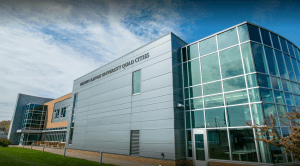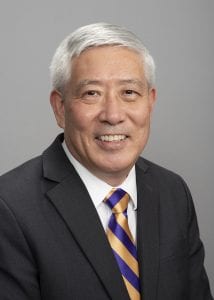BREAKING: Moline Mayor Intensifies Concerns Over WIU Quad Cities Campus
BREAKING NEWS: Moline Mayor Stephanie Acri wants to break up with Western Illinois University, but the public riverfront campus wants more time to work things out.

WIU-QC originally hoped to have 3,000 students in Moline, but the mayor says they’re currently down to just 168 students.
Last month, new WIU president Guiyou Huang wrote to Illinois Gov. JB Pritzker about ongoing discussions regarding a potential transfer of the WIU Quad-Cities campus to another state institution. Huang became president Jan. 1, 2021.
At that point, Western has not been included in the discussion, he noted, copying Mayor Acri and Quad Cities Chamber president/CEO Paul Rumler. She responded that she’s had concerns about the impact of WIU in Moline and Acri met again with Huang on March 2. It didn’t go well.
“I hoped WIU would bring new and innovative plans to the table. Since 2004, we have heard promises about how WIU would invest in the Quad-Cities campus, and how that investment would benefit Moline,” Acri said in a recent release on last week’s meeting.
“Sadly, today I was presented with the continuation of the promises that WIU has failed to deliver. I left the meeting genuinely disappointed. WIU promised we would have a student population of 3,000 on-campus students.

Stephanie Acri is mayor of Moline.
“Today, the spring 2021 enrollment is 168, with just four freshmen,” Acri noted. has engaged in a pattern and practice of turning away opportunities to grow the Quad-Cities campus and expand its relations with Moliners.” Among those past negative actions, she said, are:
- It accepted the idea of TIF funding and a developer’s plan to build residential housing for students, but never promoted it and walked away from the project.
- It rejected a gift from the Robert E. Bartlett Family Foundation to construct a state-of-the-art performing arts center on campus. The foundation later contributed $8 million for the Bartlett Performing Arts Center at Moline High School, which opened in March 2019.
- In 2016, WIU committed to being the state’s partner for the Procurement Technical Assistance Center for the Q-C region. In 2020, the university backed out of its commitment – “leaving Quad-Cities businesses who rely on these technical services without a local contract to advise them on women and minority business certification, government contracts, or subcontracts to prime private contractors.”
- The Moline Foundation gave WIU a grant for a program to recruit high-school students to pursue degrees in agriculture as a feeder program to address gaps identified by local industry leaders. After two years of missing various benchmarks, WIU abandoned the program and kept some money for administrative expenses, and just returned more than 80 percent of the grant back to the foundation.
“Time and again, WIU made promises and then broke them,” Acri wrote. “Today, WIU asked for more time to make things right with Moline.
I informed the president that Moline could not afford any more time to wait.
“As Moline looks to recover from the global pandemic’s devastating economic impact and prepare for development following completion of the I-74 Bridge project, we can’t be led down a path of broken promises for one more day,” she said.
In response to the mayor’s concerns, WIU spokeswoman Darcie Shinberger released the following statement Monday morning:
“Under the direction of WIU’s 12th President Guiyou Huang and University leadership, Western Illinois University-Quad Cities remains future-focused and committed to the regions we serve. WIU will continue to serve students in the Quad-Cities region, continue vital community outreach initiatives and further strengthen the University’s partnerships with Quad-Cities area leaders, businesses, organizations, and area schools.”
Shinberger said there would be no further response to specific issues.
“My number-one concern is what is best for our community,” Acri wrote. “The result needs to be a true education partner at that campus that is as committed to our community as we will be to it and the students it serves.”
Paul Rumler, president/CEO of the Quad Cities Chamber, has similar concerns.

Paul Rumler is president/CEO of the Quad Cities Chamber.
“The Quad Cities Chamber appreciates the opportunity to share feedback and continue to talk with state and university leaders about the vision for the Quad-Cities campus. As I have talked with WIU’s presidents over the past three years, my concern for the Quad-Cities’ campus peaked in 2019 when WIU leaders in Macomb were openly questioning the Quad-Cities campus’ value and future,” he said Monday.
“We have been talking with state and university leaders since then to explore options to preserve and maximize the Quad-Cities campus. The campus is an important asset providing post-secondary education to a diverse student base, skilled and talented workforce to area employers, and an economic impact to the greater Quad-Cities region,” Rumler said.
“We appreciate the understanding that exists among state and university leaders that continued improvements are necessary to maximize the state and community investment at this Quad-Cities campus.”
“The best intentions started with great promise, and then in the last few years, it’s fizzled,” Rumler said in an interview last month, noting negatives in WIU enrollment, marketing and change in leadership.
There have been well-publicized discussions among Western’s Board of Trustees, dating back two years, and faculty senate, questioning the value of the Moline campus, he said.

Mayor Acri noted WIU turned down private funding to build a new performing arts center, which was later done at Moline High School.
“You’ve seen a stall of private investment around the Quad-Cities campus, and involvement in the community in terms of that longer-lasting economic impact — where you’re providing a workforce that’s meeting the growing needs,” Rumler said. “All of that hit a head and we began to say, is this what we want it to look like?”
“It’s no secret that the financial status of the state of Illinois and Western Illinois University were challenged,” he said. “From our vantage point, we’re wanting to maximize the investment that’s been made here in the Quad-Cities with this campus. It’s been a longstanding goal – we want to have a very robust effort here. So, we saw that happening and decided we needed to give voice to our concerns and actually take it forward.”
When the Q-C campus opened in 2012 at 3300 River Drive, leaders hoped WIU would grow to 3,000 Moline students. In 2018, there were 1,267 Q-C students, dropping to 1,192 in 2019, and most shifting this past fall to online instruction due to Covid-19.

Guiyou Huang is president of Western Illinois University.
WIU in both its main Macomb campus and Moline saw total enrollment plunge from 13,602 in 2006 to 8,502 in 2018.
Former WIU president Jack Thomas resigned effective June 30, 2019, after weeks of pressure from alumni, Macomb residents and university affiliates, calling for him to resign or be fired.
That month, the executive committee of the Western Illinois University Foundation, an independent organization that manages university gifts, released a unanimous letter urging the board to remove Thomas and reinstate Brad Bainter, the university’s former vice president for advancement and public services who was fired at the end of May 2019.
WIU’s Alumni Council overwhelmingly passed a resolution asking the university board to terminate Thomas’ contract by the end of June 2019 if he did not resign.
The council suggested the university suffers from a “lack of direction and floundering leadership” as well as other problems, including “declining enrollment, funding shortfalls, arduous negotiations with collective bargaining units, and the departure of several senior leaders from the university.”
After Huang became WIU’s 12th president Jan. 1, 2021, Rumler met with him and asked for change, as well as meeting with Q-C state legislators and other prospective universities to see if another institution would be able to locate here.
Of Huang, the chamber chief said: “I think he is eager to serve as president for both Macomb and the Quad-Cities campus. He’s eager to do good. He understands the value of the Quad-Cities, wanting to do better. This predates President Huang. It’s been a longstanding issue. Looking at their track record of investment, it’s concerning to me that the board and others have not prioritized the Quad-Cities campus as much as we think they should have.”











